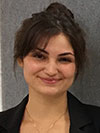A humble approach to community-based interventions
Nina Malek

I recently received a very important piece of advice for moving forward in the field of public health. During a classroom discussion focused on how we, as public health professionals, could help a community deal with a public health issue, my professor asked us “What is the first question you need to ask?” One of my colleagues offered the answer: “How can I help you?”
My professor paused for a moment before responding. “No. The first question you should ask is if you can help at all.”
To conclude my Masters of Public Health at the University of Western Ontario, I completed a practicum placement at Camp fYrefly. Founded in Edmonton, Camp fYrefly is a four-day leadership capacity and resiliency building retreat targeted towards sexual and gender minority (SGM) youth and their allies. My project involved conducting a scoping review of the literature available on promoting holistic health among SGM youth. Ultimately, my research aimed to provide recommendations to guide the development of a holistic health plan for the camp.
Through this experience, I learned that SGM youth face a number of health disparities compared to their cis-gender, heterosexual peers. While some of these disparities are linked to unsafe sexual behaviour, many are not. The majority of health disparities faced by these youths are a result of the social conditions they encounter, such as discrimination.
My scoping review yielded a number of helpful articles, many of which focused on sexual health, and suggested a need for holistic approaches in treating and educating SGM youth. After meeting with my preceptor, I felt prepared to attend a weekend at camp in Regina to see how my research could be applied. After the first day of camp, it was obvious that my weekend wouldn’t be what I was expecting.
In many ways, I represent “the majority.” It was a strange experience to feel like the outsider for a weekend. However, being pushed outside of my comfort zone provided a unique opportunity to understand the social conditions faced by many SGM youth. I, as the odd one out, watched as groups of campers found community, acceptance, and a sense of belonging unique to the camp environment. My understanding of this community’s needs grew deeper as the weekend progressed. By the end of my stay at Camp fYrefly, I knew I needed to do more to support these youths. The articles I found focused on sexual health, failing to address the many other health disparities faced by SGM youth. In addition to expanding upon the current body of research, there is a need for collaboration between professionals from public health and other disciplines to create innovative health promotion programs.
As public health professionals, we are asked to work with a number of diverse communities. The continual support and encouragement of my preceptor and professors have been instrumental in the success of my project. It is easy to conduct good research and apply textbook knowledge, but difficult to understand the needs of a community different from your own. I believe that there are always ways for an outsider to provide support, but as a student, researcher, and public health practitioner, I will never forget the value of respect, communication, collaboration, and an open mind in my practice. I plan to pursue a PhD in the coming year, applying the lessons learned during my practicum as I carry this project forward.

Post a comment